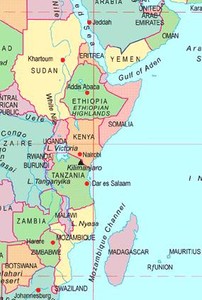Kenya, Tanzania, Mozambique now unsafe for cruising sailors
by Sail-World Cruising on 23 Nov 2010

Piracy has now made Kenya, Tanzania and Mozambique unsafe for cruisers SW
East African countries bordering the west Indian Ocean are becoming alarmed about Somali piracy spreading to their waters.
These rising acts of piracy on the East African coast, which last week included the kidnapping of two South African cruising sailors, has ignited fears of the United Nations declaring the region’s waters a war-risk operation zone or dangerous for vessels to sail on, experts warn.
All types of vessels are affected: cargo ships, fishing vessels, cruise ships and private sailing yachts.
In the past two months, Somali pirates have intensified their activities which were once more prevalent in the Red Sea and the gulf of Eden, but are now common in the Kenya, Tanzania and Mozambique territorial waters.
No word of kidnapped sailors:
In the meantime, nothing has been heard, and no ransom demand mad, for the South African sailors Bruno Pelizzari and Deborah Calitz. Their skipper, Peter Eldridge (pictured below), was rescued by a Dutch warship.
In an effort to send the message to pirates that Deborah is African born and should not be treated like a European or an American, Deborah's brother Dale van der Merwe has denied reports his sister was of British or Italian descent.
'She does not have any British ties and has never set foot in Britain. We are worried that should her captors read this... it may skew their perception of who Debbie really is and try attach values to her as in the case of the recently released British Chandler couple.'
He said the couple were 'ordinary workers'. They had been sailing for almost two years, stopping at ports on Africa's coast to 'visit and do occasional work'.
'The truth is that they sailed a boat to Dar es Salaam and got work to sail another back to South Africa, where they were hoping to visit with us after not seeing their children and family for such a long time. Anyone who knows or meets them (including their captors) will see that they are soft and kind people who are not interested in politics but only love sailing,' he said.
The family asked the couple's captors to keep them unharmed and release them back to their families.
Spreading effects of Somali piracy:
According to statistics from East Africa Seafarers Assistance programme (SAP) office, over 40 vessels have been attacked on Kenya’s territorial waters in the past two months.
SAP’s programme coordinator Andrew Mwangura says said most vessels that have been attacked in the past three months were either headed to the port of Mombasa or leaving for either Dar es Salaam or Maputo.
'Such continual attacks are sending a wrong signal to ocean carriers that the Port of Mombasa is unsafe,' said Mr Mwangura.
Shippers are now being forced to spend more on fuel as vessels are opting for longer, safer routes. Currently, vessels heading to Mumbai from Mombasa take 18 days up from 12 days, while those sailing from Dubai take 12 days up from seven.
The Kenyan economy has continued to bear the brunt of piracy activities along the coast of Somali, which includes cost of detaining and prosecuting pirates captured by the foreign naval ships on international waters.
Piracy has also brought the once flourishing cruise ship tourism in the country to its knees.
According to the Kenya Ports Authority, cruise ships arrival at the port of Mombasa has plummeted since November 2005 when the first cruise ship (MV Seaborne Spirit) was attacked by pirates en route from Mombasa .
'The annual figures that were standing at 40,000 cruise tourists then, have come down to just below 10,000. Also, over 110 fishing vessels that used to sail to Mombasa for port services every year have diminished to about 20,' said a ship chandler who did not want to be named.
He added: 'Pirates have brought the war onto the door steps of the three nations — Kenya Tanzania and Mozambique. The governments of these countries must be proactive in stopping piracy; they cannot afford to sit and wait for assistance from the EU or US.'
If you want to link to this article then please use this URL: www.sail-world.com/77247